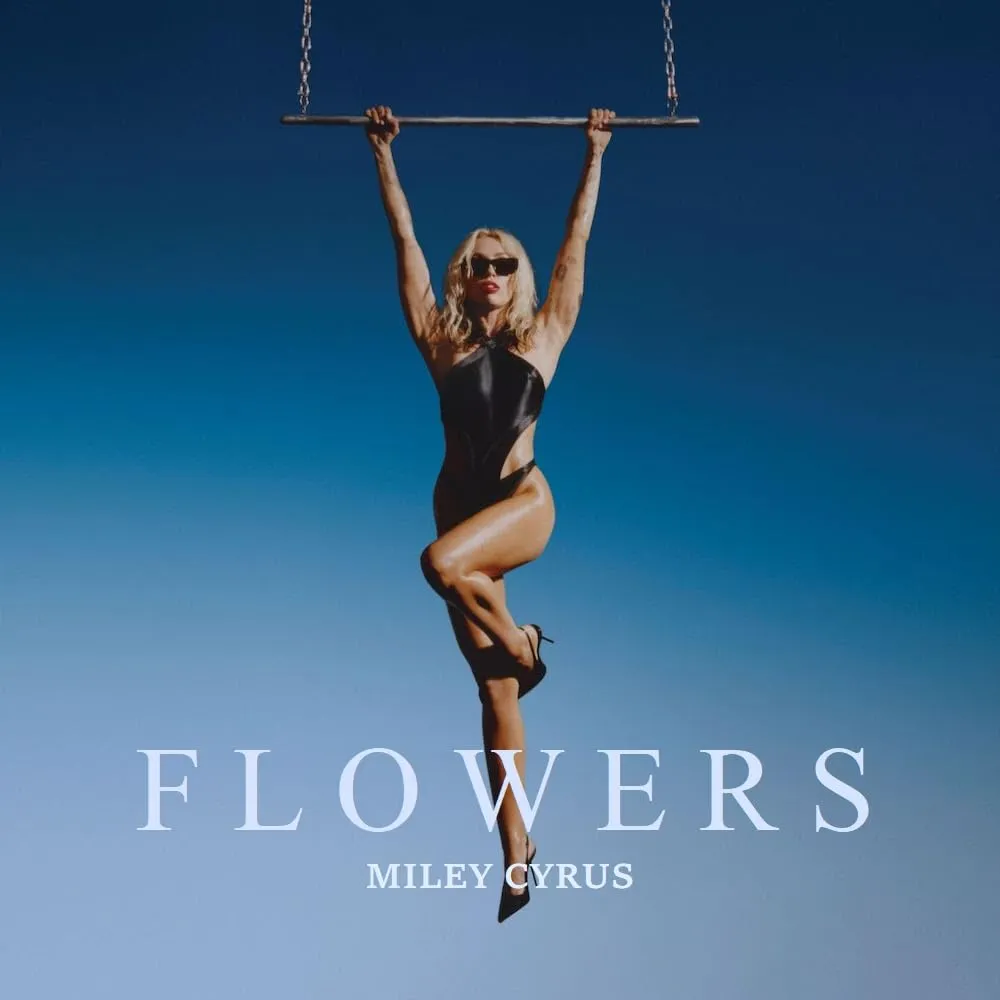

Flowers wasn’t just a song – It is a maIt is a manifesto against the imposition of love and showbiz.nifesto against the imposition of love and showbiz.
When Miley Cyrus released Flowers in early 2023, the song quickly became a global phenomenon. It wasn’t just another breakup ballad or a catchy pop tune — it was a declaration, a manifesto, and, to many, a moment of revenge. Behind its addictive melody and empowering lyrics lay something much deeper: a rebellion against the expectations of love, the pressures of the music industry, and the suffocating demands of Hollywood.
Flowers wasn’t just about heartbreak. It was about reclaiming identity, rewriting the rules of celebrity image, and proving that self-love and empowerment could outshine any scandal, any man, and any system that tried to control her.
This article will explore how Miley Cyrus transformed Flowers into more than a pop song — how she weaponized music to fight back against a culture that had both celebrated and torn her apart.
Miley Cyrus Before Flowers: The Child Star Turned Rebel
Hannah Montana and the Trap of Perfection
Before Miley Cyrus became the rebellious, edgy artist we know today, she was the Disney darling behind Hannah Montana. The role catapulted her to fame but also shackled her to an image of innocence and perfection.
The world wanted her to stay the sweet girl with blonde wigs and PG-rated jokes. But Hollywood’s expectations were a cage, and Miley knew she couldn’t live in that character forever.
Breaking Free with Scandal
When Miley broke out with her infamous 2013 MTV VMAs performance, critics called it a meltdown, a disaster, even the death of her career. In reality, it was her first act of revenge against a system that refused to let her grow up.

She swung on wrecking balls, smoked on stage, and flaunted her sexuality not because she was out of control — but because she was reclaiming control. She was tearing down the old celebrity image forced upon her.
The Birth of Flowers: More Than a Breakup Song
The Public Breakup and Its Fallout
When Miley divorced actor Liam Hemsworth, tabloids had a feast. For years, their relationship was painted as a fairy tale — the perfect couple born from The Last Song. But reality was messier.
When Flowers dropped, fans immediately connected the lyrics to Liam. The release date even coincided with his birthday. Coincidence? Many doubted it.
Lyrics as Liberation
The lyrics — “I can buy myself flowers, I can hold my own hand” — were more than clever lines. They were a rejection of dependency, a middle finger to the romantic ideals shoved down women’s throats by both love culture and Hollywood storytelling.
Miley Cyrus wasn’t just saying she was over Liam. She was saying she was over the system that told her she needed Liam.
Flowers as a Manifesto of Revenge
Revenge Against Hollywood’s Beauty Standards
For years, Hollywood dictated how Miley should look, act, and love. With Flowers, she redefined beauty on her own terms. The music video showed her confidently strutting in a golden dress, working out in lingerie, and dancing alone in a mansion.
The message was clear: self-love is more glamorous than any red-carpet romance.
Revenge Against Celebrity Image Control
The music industry loves to package female stars as perfect girlfriends, wives, or heartbreak victims. Miley Cyrus shattered that archetype. With Flowers, she turned heartbreak into a weapon of empowerment, flipping the narrative of victimhood into victory.
Revenge Against Love Itself
Most pop songs worship romantic love as the ultimate goal. But Flowers declared something revolutionary: that being single, independent, and self-fulfilled is not only enough — it’s powerful. In a culture that thrives on love scandals, Miley’s anthem was radical.
The Global Impact of Flowers
Chart Domination
Flowers didn’t just trend; it conquered. It debuted at #1 on the Billboard Hot 100, broke streaming records on Spotify, and stayed in the top charts for weeks. The world wasn’t just listening; the world was living it.
Fans’ Reaction
For fans, Flowers became more than a song — it was therapy. Women and men alike posted TikToks of themselves celebrating independence with the track. Hashtags like #SelfLove and #FlowersChallenge went viral.
Fans saw in Miley’s revenge not bitterness, but strength. They turned the song into a global movement for empowerment.
A Cultural Reset
From gyms to weddings, from protests to Instagram captions, Flowers became the anthem of a generation tired of being told they needed someone else to be complete.
Celebrity Reactions and Hollywood Buzz
Hollywood in Shock
While fans cheered, Hollywood whispered. Industry insiders debated: had Miley just sabotaged her career by openly targeting her ex? Or had she pulled off the greatest PR move of the decade?
Some executives worried that rejecting traditional love songs might alienate mainstream audiences. Instead, it did the opposite: it drew more people in.
Fellow Artists Speak Out
Stars like Adele, Taylor Swift, and Lady Gaga subtly praised Miley Cyrus’s boldness. Empowerment anthems had existed before, but Flowers felt different — sharper, bolder, more unapologetic.
Critics and Analysts
Music critics called Flowers a “post-breakup revolution.” Feminist writers hailed it as a cultural milestone in the battle against outdated love narratives. Some even argued it was the most important feminist pop song since Beyoncé’s Single Ladies.
Flowers as a Turning Point in Miley’s Career
From Wild Child to Wise Woman
For years, the media branded Miley Cyrus as the wild child of pop — unpredictable, scandalous, and self-destructive. But Flowers reframed her image. Suddenly, she wasn’t reckless; she was wise, mature, and ahead of her time.
The New Celebrity Image
With Flowers, Miley gained a new identity: the queen of self-love. Her celebrity image shifted from chaotic rebel to empowered icon. Brands, magazines, and even the music industry had to adjust to the new narrative.
Future Implications
If Flowers was her revenge anthem, what comes next? Fans speculate her next albums will lean more into raw authenticity, storytelling, and defiance against the machine of Hollywood.
The Psychology Behind Flowers
The Self-Love Revolution
Psychologists pointed out that the success of Flowers reflected a broader cultural shift. People are tired of toxic love cycles. The rise of self-love and empowerment movements created the perfect soil for the song to blossom.
Breaking the Myth of Romantic Salvation
For centuries, art — especially in Hollywood — sold us the myth that happiness comes only through finding “the one.” Miley Cyrus broke that myth with one anthem.
Revenge as Healing
What some call “revenge” is often just healing in disguise. By turning her heartbreak into a global hit, Miley transformed pain into power.
Flowers and Feminism: A Modern Anthem
A Song for Women Everywhere
For women trapped in toxic relationships, for girls told to wait for Prince Charming, Flowers became a lifeline. It was more than music — it was liberation.
Empowerment Beyond Gender
Though celebrated by women, Flowers also resonated with men and non-binary listeners. Its message of independence crossed gender lines.
Hollywood’s Uneasy Response
Not everyone in Hollywood welcomed the feminist undertones. Some critics accused Miley of being “too political” or “too bitter.” But the song’s success proved otherwise.
The Legacy of Flowers in the Music Industry
Reshaping Pop Music
The music industry thrives on love songs, but Flowers shifted the formula. Suddenly, labels saw the value in songs about independence, self-growth, and defiance.

Inspiring Other Artists
Rising stars have cited Miley Cyrus as an influence for writing more authentic music. Her revenge anthem encouraged others to reject formulaic love tracks.
Cementing Miley’s Legacy
With Flowers, Miley didn’t just score another hit. She cemented her place as one of the most important voices of her generation — a disruptor, a rebel, and a leader.
Conclusion: Flowers as the Ultimate Revenge
Flowers was never just a song. It was Miley Cyrus’s revenge on Hollywood, on the music industry, on toxic love, and on the very idea that perfection lies in romantic partnership.
It was an anthem of self-love, a declaration of independence, and a reminder that true empowerment comes not from who loves you — but from loving yourself.
In the end, Miley Cyrus didn’t just sing about buying her own flowers. She rewrote the script of fame, romance, and power. She showed the world that revenge doesn’t always come in the form of destruction — sometimes, it comes in the form of blooming.
And with Flowers, she bloomed brighter than ever before.


















